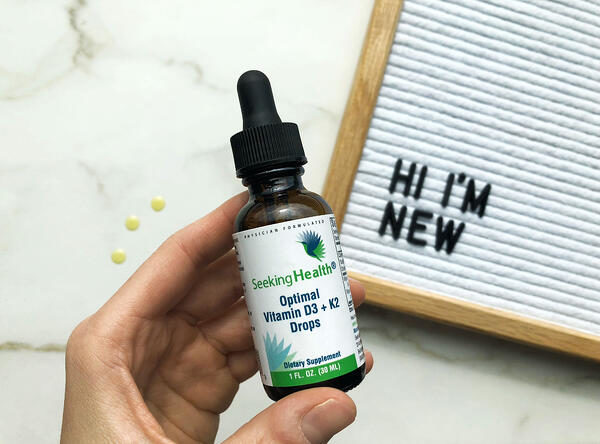Does Vitamin D Need Vitamin K
Does Vitamin D Need Vitamin K
Vitamin D & K – Do you need to take them together?
Vitamin D3 & K2 are a pivotal combination, because they work together to optimize the flow of calcium through your body.
This process ultimately supports healthy bone composition.*
Would you say most people know the benefits of Vitamin D (that it may support bone strength, the immune system, circulatory support, etc.), but many don't realize that Vitamin D NEEDS Vitamin K2 to maximize benefits…? *
If someone is fighting vitamin D deficiency, they may need to supplement with vitamin K2 as well. *
This robust team now comes in an easy to use liquid delivery method, Optimal Vitamin D3+K2 drops. One drop will do the trick!
Why would you want to take these two in congruence?
Well in short, vitamin D3 takes calcium out of your blood and vitamin K2 transports calcium into your bones.
Because vitamin D is required for absorption of calcium, it is an important nutrient for supporting healthy bones and structural health.*
Vitamin D is essential for the functioning of many important systems in the body, and recent research has suggested that we may need more vitamin D than previously thought for optimal immune function and long-term health.*
Also, taking Vitamin K2 along with Vitamin D3 may help maintain healthy arterial elasticity, whereas vitamin D alone cannot.*
Did you know…?
Vitamin D3 is more biologically active in the body than D2, the form often used to fortify dairy products and other foods.*
What about D3's teammate, vitamin K2?
Vitamin K is an important fat-soluble vitamin essential for circulatory health and normal bone mineralization.*
Several different forms of vitamin K exist, with the primary dietary form being vitamin K1, or phylloquinone, found primarily in green vegetables.
Another form known as vitamin K2, or menaquinone, is found primarily in animal products such as meat or eggs, as well as in foods such as cheese and natto, a fermented soy product. While most of the benefits of vitamin K were previously attributed to vitamin K1, recent research has identified important benefits for vitamin K2.*
Why the new liquid form?
Both vitamins are fat soluble and need a fatty substance to be transported and absorbed within the body.
The NEW drops are in an olive oil base, that is it, no fillers, sweeteners, or preservatives!

How frequent is Vitamin D3+K2 deficiency?
Vitamin D3 deficiency is extremely common in all parts of the world regardless of sun exposure (due to being indoors, melanin concentration, clothing, sunscreen, malabsorption) and obesity. [1]
Vitamin K2 deficiency is less common; however, certain populations are more at risk.
See this article,'Who or when should one take vitamin D3+K2?' for more information.
Some common signs of not having adequate levels of vitamin D are fatigue, weak bones, dizziness, and muscle aches.
Vitamin K2 deficiency includes weak bones, heart issues, or tooth decay.
Who should not take Vitamin D3+K2?
Those who have a sensitivity to any of the ingredients and/or have been advised not to supplement with D3 or K2 by their healthcare professional should not take vitamin D3+K2. Always consult with your healthcare professional before taking a new dietary supplement.
Precautions:
Do not use vitamin D3+K2 if taking anticoagulant medications, such as warfarin, without first consulting with your healthcare professional.
Why is MK4 used instead of MK7?
Research on MK4 shows that that form has demonstrated the ability to decrease bone fractures. [2]
How does it work?
The major form of vitamin K in the diet is K1 known as phylloquinone which comes primarily from a plant-based diet. Phylloquinones are converted into vitamin K2, as MK4 (menaquinone) naturally in the body.
If one is not consuming plant-based foods, then a deficiency of vitamin K2 as MK4 is highly probable.
Animal products do contain MK4 but lower amounts with the exception of chicken meat. MK4 is found naturally in the milk of animals including breastmilk.
MK4 is the major form of vitamin K in the brain where it concentrates in the myelinated areas. This is incredibly important for cognitive function.
MK4 also supports gene expression surrounding bone formation, bone repair and collagen.
Vitamin K and the Brain:
MK4 is the major form of Vitamin K in the brain, where it concentrates in the myelinated areas. (This is incredibly important for cognitive function.) MK4 also supports gene expression surrounding bone formation, bone repair and collagen.
A quick note about MK4 vs. MK7: Why is MK4 used instead of MK7?
MK7 is naturally produced by bacteria found in our digestive system, specifically the small and large intestine. By supplementing with beneficial probiotics, your body may actually generate its own MK7.
Can pregnant and breastfeeding women take Vitamin D3+K2?
Yes, unless directed otherwise by your healthcare professional.
It is advised to take vitamin K2 while pregnant because newborns are at high risk for vitamin K deficiency.*
Unfortunately, while in utero, babies do not receive much vitamin K from the mother as it doesn't transfer very well. So, if you supplement with K2, the better chance of passing some on to your baby.* [4]
Breastfeeding infants are also at a high risk of vitamin K deficiency as human milk does not have much vitamin K. However if nursing mothers are taking vitamin D3 and K2, then these vitamins will pass through into the breastmilk. [5]
More over, it's good to know that commercial infant formulas are now routinely supplemented with vitamin K.
Newborns, as well, are at risk for vitamin K deficiency because their microbiome is not fully developed. The microbiome makes a significant amount of vitamin K.
Can children take Vitamin D3+K2?
Yes, children 4 years and older can take vitamin D3+K2, as directed by their healthcare professional.
Who should take Optimal Vitamin D3+K2 drops ?
- Those who are using antibiotics. The microbiome produces a significant amount of vitamin K and antibiotics kill the good flora in the gut.*
- Expectant Mothers. Vitamin K2 is needed for bone growth and central nervous system development while Vitamin D3 is needed for immune support, blood sugar support, bone growth and many other roles.
- Those who are breastfeeding. Newborns are vitamin K2 deficient and vitamin D3 deficient. When a mother supplements with these vitamins they are passed to the newborn though breast milk.
- Those receiving parenteral nutrition. Fat soluble nutrients are commonly deficient in those receiving IV feedings.
- Those who have undergone gastric bypass. Reduces the absorption of fat soluble vitamins.
- Those with IBD or IBS. These conditions reduce the absorption of fat soluble vitamins.
- Those taking antacids. Consuming antacids reduce the absorption of fat soluble vitamins.
- Those who experience gallstones. Gallstones reduce the absorption of fat soluble vitamins.
Who should NOT take Optimal Vitamin D3+K2 drops?
Many healthcare professionals are against vitamin K2 supplementation while taking anticoagulant medications; however, this is unsupported as Vitamin K is needed to protect against arterial calcification.
The appropriate way is to evaluate prothrombin times and INR scores with your healthcare professional. In this way, Vitamin K may be taken alongside anticoagulant medications if your healthcare professional adjusts and monitors you. [3]
If you are taking anticoagulant medications, locate Vitamin K2 as MK7 and work with your healthcare professional. *
NOTE: Mothers using warfarin during pregnancy have increased risk of fetal central nervous system damage. Warfarin in general reduces MK4's ability to protect myelin in the brain.
- What about other anticoagulant medications? Can I take Vitamin D3/K2 if taking aspirin?Talk with your healthcare professional. Aspirin is an antiplatelet medication vs anticoagulant and works differently than warfarin. Research and clinical evidence demonstrates that vitamin K2 and aspirin do not interfere with each other. Therefore, they can be used together safely with the permission of your healthcare professional. *
Consider talking to your doctor about OptimalVitamin D3 + K2 drops!
 Sources:
Sources:
[1] Biochemical, Physiological and Molecular Aspects of Human Nutrition, 3rd edition, Stipanuk and Caudill, Elsevier, 2013
[2] https://www.ncbi.nlm.nih.gov/pmc/articles/PMC5613455/
[3]https://www.consumerlab.com/answers/does-vitamin-k-interfere-with-blood-thi…
[4] https://www.cdc.gov/ncbddd/vitamink/facts.html
[5] https://www.ncbi.nlm.nih.gov/pubmed/11787707
This article is not intended as a substitute or replacement for the advice of a healthcare professional. Consult your healthcare professional prior to starting, stopping or making changes to your healthcare regimen.
*These statements have not been evaluated by the Food and Drug Administration. This product is not intended to diagnose, treat, cure, or prevent any disease.
Topics: Bone Health, Calcium Absorption, D3, MK7, Vitamin D, Vitamin K
RECENT ARTICLES
Source: https://education.seekinghealth.com/d3-needs-k2-to-function/



Tidak ada komentar:
Tulis komentar